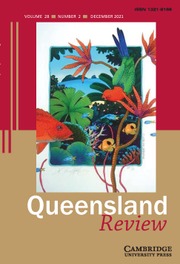Article contents
Prosecutors or Protectors? Police and Aborigines in Pre-Separation Queensland
Published online by Cambridge University Press: 26 February 2016
Extract
If any characteristic has distinguished the police in Australia from their original models in England or Ireland, it has been their continually changing role in the government of Aborigines.
In the 1830s and 40s, in the absence of any real law enforcement body, uncontained conflict between settlers and Aborigines in what was to become southern Queensland resulted in a spiral of violence that was at times gratuitous. Some whites killed blacks out-of-hand. For their part, Aborigines retaliated when and how they could. One settler, for example, told how in a little over two years fifteen of his shepherds had been murdered and whole herds of his animals had been butchered simply for the fat their kidneys contained.
- Type
- Research Article
- Information
- Copyright
- Copyright © Cambridge University Press
References
Endnotes
1 Finnane, M. 1994, Police and Government: Histories of Policing in Australia; Oxford University Press, Melbourne, 111.Google Scholar
2 Roberts, S. 1975, The Squatting Age in Australia, Melbourne University Press, Carlton, 88.Google Scholar
3 Skinner, L. 1977, ‘The Days of the Squatting Acts District of Darling Downs and Moreton Bay’, Queensland Heritage, No.3, Government Printer, Brisbane, 325.Google Scholar
4 A shilling was 1/20th of a pound sterling and was considerably more than a rural worker earned.Google Scholar
5 Simpson to Colonial Secretary (Col Sec) 44/8104, John Oxley Library, Micro film (MF) A2/14.Google Scholar
6 O'Sullivan, . 1972, Mounted Police of NSW, Melbourne University Press, Melbourne, 74.Google Scholar
7 There were 240 pence in a pound sterling.Google Scholar
8 See for example N. Loos 1982, Invasion and Resistance: Aboriginal-European Relations on the North Queensland Frontier 1861–1897, ANU Press, Canberra, 26.Google Scholar
9 Walker, Frederick, first Commandant of the Northern Native Police, told the Colonial Secretary (hereafter Col Sec) that no force on earth could keep Aborigines who did not wish to remain there, in the Queen's service, neither did he believe anyone should attempt to do so. See also Queensland Votes and Proceedings, 1875, and Queenslander, 7 October 1876.Google Scholar
10 See Pike, D. (ed) 1996, Australian Dictionary of Biography, Vol. 6, Melbourne University Press, Melbourne, 338–9.Google Scholar
11 See Moreton Bay Courier, 17 April 1847. I can find no case where this happened as a result of ill treatment of Aborigines, but the potential existed and caused considerable anguish in pastoralist circles.Google Scholar
12 This was reported in the Moreton Bay Courier on 29 June 1850, almost a year after it happened.Google Scholar
13 Walker to Col Sec 1 March 1852, cited in Moreton Bay Courier, 17 July 1852.Google Scholar
14 ‘Keeping them out’ was the term used to describe the practice of denying Aboriginal people access to pastoral leases. There is considerable argument as to whether or not this practice was legal, but many settlers believed that letting blacks on to leases during the early years of settlement was tantamount to committing suicide.Google Scholar
15 Walker to Col Sec, 1 March 1852.Google Scholar
16 Walker to Col Sec, 1 March 1852.Google Scholar
17 Report of the Select Committee into Native Police and the Condition of Aborigines Generally, Queensland Votes and Proceedings 1861, 17.Google Scholar
18 Walker to Col Sec, 14 June 1853 MF, A2/26, Col. John Oxley Library.Google Scholar
19 Sec 15 June 1850, MF. A2/52, Col. John Oxley Library.Google Scholar
20 Walker to Col Sec, 8 August 1853, MF. A2I28 Col. John Oxley Library.Google Scholar
21 Col Sec, 13 December 1853, MF, A2/23, Col. John Oxley Library.Google Scholar
22 Minutes of the Executive Council in 1855 show that Sir William Denison wanted to prosecute Walker.Google Scholar
23 Walker has been criticised by many authors. See for example, G. Reid, A Nest Of Hornets, 185; N. Loos, Invasion and Resistance, 20; H. Holthouse, Up Rode the Squatter: The savage beginnings of Queensland's West, (Adelaide, 1970), 129; and F. Robinson & B. York, The Black Resistance, (Maryborough, 1977), 116.Google Scholar
- 1
- Cited by




